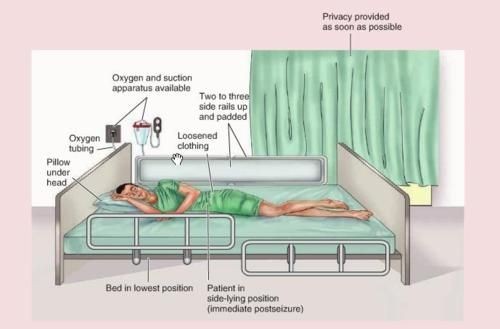A nurse is assisting with the care of a client who is receiving a spinal epidural to treat a herniated disc.
Which of the following findings should the nurse identify as an indicator of unrelieved pain?
Urinary retention
Constipation
Difficulty swallowing
Restlessness
The Correct Answer is D
Restlessness can be an indicator of unrelieved pain in a client who is receiving a spinal epidural to treat a herniated disc. Restlessness is often a manifestation of discomfort or agitation, which can be caused by inadequate pain management. When a client's pain is not adequately relieved, they may exhibit restlessness as they try to find a more comfortable position or seek relief from the discomfort.
Urinary retention (option A) is incorrect because it can be a side effect of certain medications used in pain management, such as opioids, but it is not a specific indicator of unrelieved pain. It is important to monitor for urinary retention as a potential complication of spinal epidural anaesthesia, but it is not directly related to pain relief.
Constipation (option B) is incorrect because it is another possible side effect of opioid medications, but it is not a specific indicator of unrelieved pain. It is important to address constipation as a potential adverse effect of pain management, but it is not a direct indicator of pain relief.
Difficulty swallowing (option C) is incorrect because it is not a common indicator of unrelieved pain in the context of a spinal epidural. It may be associated with other conditions or complications but is not specifically related to pain relief.

Nursing Test Bank
Naxlex Comprehensive Predictor Exams
Related Questions
Correct Answer is B
Explanation
Correct answer: B
a. Lowering the side rails is unnecessary and could increase the risk of falling. The side rails should be raised and padded instead.
b.The nurse should observe and document the duration of the seizure. This information helps in assessing the severity and guiding further interventions
c.Restraining the client's arms and legs to prevent injury is not recommended during a seizure. Restraining a person during a seizure can increase the risk of injury and may impede their ability to move or protect themselves during the seizure.
d.Inserting an oral airway into the client's mouth is not indicated during a tonic-clonic seizure. It is generally not recommended to place any objects or devices into the mouth of a person having a seizure, as it can potentially cause injury to the person or damage to the airway

Correct Answer is B
Explanation
I can remove my security band to give it to a family member.
In healthcare facilities, security measures are implemented to ensure the safety and identification of patients and newborns. One common security measure is the use of identification bands for both the mother and the baby. These bands typically have matching identification numbers or barcodes that help staff members verify the identity of the individuals and ensure they are correctly paired.
Option A is incorrect because removing the security band and giving it to a family member would compromise the system's security and potentially lead to confusion or incorrect identification.
Option C is incorrect because taking the baby to the lobby to visit family can increase the risk of unauthorized individuals gaining access to the baby or potentially interfering with the security measures in place.
Option D is incorrect because carrying the baby to the nursery without following the facility's security protocols can also compromise the identification and safety measures.
The best response indicating an understanding of the teaching is option B, as it recognizes the importance of having an identification band that matches the one worn by the baby. This indicates awareness of the security measures in place and the need to ensure accurate identification and safety.
Whether you are a student looking to ace your exams or a practicing nurse seeking to enhance your expertise , our nursing education contents will empower you with the confidence and competence to make a difference in the lives of patients and become a respected leader in the healthcare field.
Visit Naxlex, invest in your future and unlock endless possibilities with our unparalleled nursing education contents today
Report Wrong Answer on the Current Question
Do you disagree with the answer? If yes, what is your expected answer? Explain.
Kindly be descriptive with the issue you are facing.
